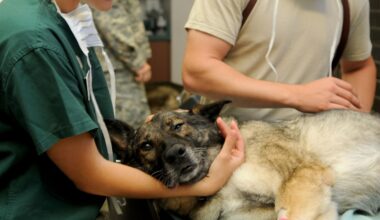Innovative Volunteer Roles in Modern Dog Adoption Centers
Dog adoption is an essential part of rescuing canine companions and providing them with loving homes. Volunteers play a crucial role in supporting adoption centers, ensuring that dogs receive the care they need. A primary role for volunteers includes assisting in daily operations, such as feeding and exercising the dogs. These volunteers can help create a routine that reduces stress for the animals during their transition into a new environment. Furthermore, volunteers are often responsible for socializing dogs, helping them interact with people and other pets. This interaction is vital for developing positive behaviors that make dogs more adoptable. Additionally, facilitating meet-and-greet sessions between potential adopters and dogs is another primary responsibility of volunteers. Such interactions allow potential pet owners to bond with the animals before making adoption decisions. Promoting the adoption message in the community can also be part of a volunteer’s duties, creating awareness about the benefits of adopting rather than shopping for pets. Online presence through social media channels helps in showcasing the dogs available for adoption, which often elevates their chance of finding a home. These innovative roles come together to enhance adoption success rates.
The Importance of Fundraising Activities
Another vital area for volunteers in dog adoption centers is participating in fundraising activities. These events are critical for generating the necessary funds to maintain the shelter’s operations. Volunteers can help organize events such as charity walks, bake sales, or dog shows. Engaging the community through these initiatives not only brings in funds but also raises awareness about the shelter’s mission and the importance of dog adoption. Volunteers often take the initiative to find local businesses willing to sponsor events, providing prizes or venues for activities. Regularly scheduled events can create a consistent stream of support for the shelter, enhancing its sustainability. It offers volunteers an opportunity to showcase their commitment to animal welfare and building connections within the community. Promoting events through social media is another role volunteers can take on, ensuring that maximum participation occurs. Utilizing platforms like Instagram and Facebook helps reach a broader audience, attracting potential donors and volunteers. Coordinating with other animal welfare groups can also amplify fundraising efforts. By cultivating partnerships, volunteers create a united approach to tackling the challenges of dog homelessness and start a wave of positive change.
Dog adoption centers often rely on volunteers to provide educational services about pet ownership and responsible adoption practices. By offering workshops or information sessions, volunteers can help educate potential pet owners about the responsibilities involved in owning a dog. Topics addressed in these sessions may include training, nutrition, and the importance of regular veterinary care. Volunteers can also create educational materials, such as flyers or online content, detailing the benefits of adopting dogs, including how this can positively impact community dynamics. By empowering prospective adopters with knowledge, volunteers increase the likelihood of successful adoptions. They also assist adopters with post-adoption support, helping them overcome challenges that may arise during the transition period. This ongoing support can significantly contribute to reducing the number of dogs being returned to shelters. Volunteers can help create private support groups, fostering a sense of community among adopters. Offering new pet owners reassurance and guidance illustrates a commitment to both the dog and its new family. The role of educators within dog adoption centers is essential to nurturing long-term, harmonious relationships between pets and their adopters.
Fostering Programs and Their Impact
A unique volunteer opportunity in dog adoption centers is participating in fostering programs. Foster homes provide temporary care for dogs who may struggle in a shelter environment, especially those with special needs or behavioral issues. Volunteers who foster dogs help them acclimate to home life, often leading to better socialization and increased adoptability. Fostering can also relieve overcrowding in shelters, ultimately saving more lives. Volunteers receive training and resources to equip them for successful fostering experiences. This role significantly impacts dogs’ physical and emotional well-being, allowing them to thrive in a home-like setting. Fosters can provide valuable feedback to adoption centers about the dogs’ behavior, further helping the staff place the dogs in suitable forever homes. Sharing stories and updates on social media platforms raises awareness of the need for fostering and helps find permanent adopters. Volunteers can also engage with potential adopters through meet-and-greet events focused on foster dogs. By hosting these events, they promote not only the dogs available for adoption but the importance of fostering. Volunteering as a foster is a rewarding experience that plays an integral role in the dog adoption process.
Another innovative role for volunteers at dog adoption centers is engaging in outreach programs. These initiatives often target schools and community groups to promote the importance of adopting dogs and humane treatment of animals. Volunteer outreach coordinators can work on developing programs that educate children about empathy toward animals. Additionally, they provide hands-on activities, like responsible pet care demonstrations, to demonstrate practical examples of care and the responsibilities of dog ownership. Collaborating with local schools can foster a culture of respect and compassion for animals among future generations. Implementing volunteer-led community service projects encourages families to get involved too. By creating family-oriented events at the adoption center, volunteers increase community participation and support for their missions. Sharing the inspiring stories of successful adoptions can motivate more families to consider bringing a dog into their homes. Volunteers can leverage local media to tell these stories, generating more positive awareness around dog adoption. Long-term engagement with the community through outreach programs helps break the stigma surrounding shelters, showing that they can produce happy and healthy dogs ready for loving homes.
Technology and Volunteer Coordination
Technology is transforming the way volunteers engage with dog adoption centers. Many organizations now use online platforms for scheduling, communications, and training purposes. Applications and websites allow volunteers to sign up for shifts, events, and training sessions easily. This convenience fosters greater participation and helps ensure that the adoption centers always have sufficient staff. Additionally, social media platforms serve as essential communication tools for volunteers. They can share experiences, stories, and photos of dogs in need of homes, attracting potential adopters. Many organizations also utilize technology to provide virtual training sessions, making it easier for volunteers to participate regardless of their location. By incorporating these technologies, dog adoption centers streamline their volunteer management processes. They can collect feedback through surveys, improving the volunteer experience over time and ensuring everyone’s needs are met. Empowering volunteers with effective technological tools enhances overall efficiency and attracts a diverse group of individuals to support the cause. Providing tech-savvy volunteers with roles in digital marketing or content creation allows them to contribute their unique skills while aiding canine companions in finding forever homes.
In summary, innovative volunteer roles in dog adoption centers significantly enhance the lives of dogs and their potential adopters. By supporting various initiatives, volunteers ensure that dogs receive adequate care, community education, and effective outreach opportunities. Their involvement in fostering, fundraising, and volunteer coordination showcases the diverse ways one can contribute to the mission of animal welfare. Each volunteer’s unique skill set contributes to a more positive environment for both the dogs and the people who seek to adopt them. As these centers continue to evolve and adopt new methods, volunteers remain essential to their success and sustainability. The dedicated efforts of volunteers ultimately create lasting impacts that resonate far beyond the walls of adoption centers. Strengthening community ties through educational outreach, innovative fundraising initiatives, and supportive fostering will lead to increased adoption rates. Those passionate about helping dogs find forever homes should consider volunteering at local shelters or adoption centers. Together, through collaboration and commitment, we can create brighter futures for countless dogs waiting to be adopted into loving families.





